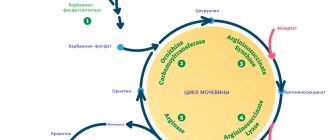What is urea
Urea is one of the products of protein metabolism. Otherwise, this compound is called urea. During gestation, the metabolism of proteins (proteins) is significantly accelerated, since these substances are necessary for the placenta and normal development of the embryo.
Urea is the end product of protein metabolism. This substance is excreted from the body mainly through the excretory organs. The accumulation of such breakdown products is harmful. Urea is an ammonia compound and is toxic to both the expectant mother and the fetus. This applies to increased levels of urea. However, a low level of urea in the blood during pregnancy also indicates pathology.
During the gestational period, the body contains a large amount of fluid. In addition, the excretory organs try to dispose of harmful substances as quickly as possible in order to protect the fetus. These factors lead to a decrease in blood urea during pregnancy. However, a drop in urea levels is not always due to natural causes. In some cases, this may be caused by various pathologies.
Urea
Urea is the main breakdown product of proteins. It is the chemical form in which nitrogen that the body does not need is removed through urine.
Research method
UV kinetic test.
Units
mmol/l (millimoles per liter).
What biomaterial can be used for research?
Venous, capillary blood.
How to properly prepare for research?
- Do not eat for 12 hours before the test.
- Avoid physical and emotional stress and do not smoke 30 minutes before donating blood.
General information about the study
Urea is one of the end products of protein metabolism, containing nitrogen. It is produced in the liver, transported by the blood to the kidneys, where it is filtered through the glomerulus and then excreted. The blood urea test result is an indicator of glomerular production and urine excretion.
Rapid protein breakdown and kidney damage rapidly raise blood urea levels.
The amount of urea released is directly dependent on the level of protein consumed by a person; the reasons for an increase in urea in the blood are feverish conditions, complications of diabetes, and increased hormonal function of the adrenal glands. Elevated urea levels are a marker of decreased glomerular filtration.
Urea is one of the main metabolites in the blood; the body does not use it in any way, but only gets rid of it. Since this excretion process is continuous, a certain amount of urea is normally always present in the blood.
What is the research used for?
- To assess kidney function in a range of conditions (in conjunction with a creatinine test).
- For the diagnosis of kidney disease and for checking the condition of patients with chronic or acute renal failure.
What do the results mean?
Reference values (norm of urea in blood):
| Age, gender | Reference values |
| 1.8 - 6 mmol/l | |
| 4 – 14 years | 2.5 - 6 mmol/l |
| 14-20 years | 2.9 - 7.5 mmol/l |
| 20 – 50 years old, male | 3.2 - 7.3 mmol/l |
| 20 – 50 years, female | 2.6 - 6.7 mmol/l |
| > 50 years old, male | 3 - 9.2 mmol/l |
| > 50 years old, female | 3.5 - 7.2 mmol/l |
Reasons for increased urea levels in the blood:
- decreased kidney function,
- chronic kidney disease,
- obstruction of the urinary tract (bladder tumor, prostate adenoma, urolithiasis, etc.),
- bleeding from the upper gastrointestinal tract (peptic ulcer of the stomach, duodenum, cancer of the stomach, duodenum, etc.),
- diabetes mellitus with ketoacidosis,
- increased protein catabolism in cancer,
- taking corticosteroids, nephrotoxic drugs, tetracyclines, excess thyroxine,
- use of anabolic steroids,
- high protein diet.
Reasons for low urea levels in the blood:
- liver failure,
- some liver diseases,
- acromegaly,
- fasting, low protein diet,
- intestinal malabsorption,
- nephrotic syndrome,
- pregnancy (increased protein synthesis and increased renal filtration cause a decrease in the amount of urea in pregnant women).
What can influence the result?
In children and women, the level of urea in the blood is slightly lower due to lower muscle mass than in men.
A decrease in the level of this indicator occurs during pregnancy due to an increase in blood volume.
Standards of analysis
As already mentioned, urea levels can be determined by biochemical analysis. For this study, blood is taken from a vein. This test can be done at any clinic. At the same time, cholesterol, creatinine, glucose and other compounds are also determined.
The normal level of urea in the blood during pregnancy is considered to be from 2.5 to 7.1 mmol/l. This applies to the first half of the gestational period. In the third trimester, the upper limit of normal is considered to be 6.3 mmol/l. In the later stages of pregnancy, the removal of harmful substances from the body, as a rule, increases. The excretory organs work especially actively during this period.
The results of the analysis must be shown to the attending physician. If there are deviations from the norm, the specialist will prescribe additional diagnostic tests.
Urea rate
The permissible presence of urea in the blood varies depending on the age of the person and is expressed in certain numbers:
- 1.8-6.4 mmol/l. – children of early and teenage age.
- 2.5-6.4 mmol/l – adults under 60 years of age.
- 2.9-7.5 mmol/l – over 60 years.
In newborns, this value is slightly higher than children's indicators due to certain physiological characteristics. In women, the normal level is lower than in men.
The content of urea in the blood depends on the state of water-salt metabolism, its synthesis in the liver, as well as the throughput of the renal filter. Indicators within normal limits confirm the presence of a balance between the activities of these organs. Deviations from the norm can be caused by various pathologies; therefore, it is necessary to identify the causes of these manifestations in a timely manner.
The simplest and most reliable method for determining urea is the enzymatic method using urease. Its principle is that under the influence of an enzyme, urea decomposes into carbon dioxide and ammonia.
Blood is taken for analysis from a vein in the morning on an empty stomach. To obtain reliable results, you need to limit your intake of food containing excess protein the night before. This study is carried out to check the functional activity of the liver and kidneys.
Reasons for reducing urea
A reduced level of urea in the blood during pregnancy may be due to the following reasons:
- liver pathologies;
- dysfunction of the pituitary gland and hypothalamus;
- kidney diseases;
- pathologies of the stomach and intestines;
- use of certain drugs;
- lack of protein in the diet.
If deviations in the analysis are associated with poor diet or medication, then such causes can be easily eliminated. In these cases, it is enough to introduce protein-rich foods into the diet or reduce the dosage of medications. Usually, after this, the level of urea in the blood during pregnancy returns to normal. If deviations in the analysis are caused by pathology, then it is necessary to undergo a course of therapy for the underlying disease.
general characteristics
Urea is the end product of protein metabolism in the body. It is removed from the body by glomerular filtration, reabsorbed by the tubular epithelium of the kidneys and secreted by tubular cells. In pathology, changes in the level of urea in the blood depend on the ratio of the processes of urea formation and its excretion. The removal of urea from the body is proportional to the protein content in the diet. Urea excreted in the urine accounts for about 90% of the nitrogenous metabolites excreted from the body. In young children and during pregnancy, due to increased protein synthesis, the urea level is slightly reduced compared to the norm for adults. The determination of urea is used to monitor the state of the process of anabolism and catabolism in the body.
Liver diseases
Liver disease is the most common cause of low urea. This organ is involved in the processing of proteins. Deterioration of its functioning always leads to metabolic disorders.
The cause of a decrease in urea can be hepatitis, cirrhosis, and liver tumors. As a result, a pregnant woman's protein metabolism decreases and urea is formed in small quantities. Such pathologies are usually accompanied by pain on the right side under the ribs, yellowing of the skin and dyspeptic symptoms.
Taking certain medications can adversely affect the liver and lead to a drop in carbamide levels. Such medications include:
- preparations containing acetylsalicylic acid;
- cephalosporin antibiotics;
- tetracycline-based antibacterial drugs;
- cytostatics.
These drugs should not be taken during pregnancy. This is due not only to their hepatotoxicity. Such medications can adversely affect the development of the fetus.
Pituitary and hypothalamic disorders
Diseases of the pituitary gland can also cause a woman to have low urea in her blood during pregnancy. This may be associated with a serious illness such as acromegaly. With this pathology, the patient has an increased level of growth hormone (somatotropin). It suppresses the formation of urea.
The disease manifests itself in the growth of the facial part of the skull, hands and feet. The most common cause of the pathology is a pituitary tumor. The woman needs to consult an endocrinologist and neurosurgeon. If the tumor is large, surgery is performed in the second trimester to remove the tumor. Surgical intervention is performed in the most gentle way - through the nasal passage.
Another reason for a decrease in carbamide may be excessive release of antidiuretic hormone (vasopressin). This substance is produced in the hypothalamus. This condition is called Parhon's syndrome. With this pathology, the level of sodium and urea in the blood drops. The disease is accompanied by sudden weight loss, convulsions and vomiting. It is necessary to limit the amount of fluid consumed and take vasopressin antagonists.
Diseases of the excretory organs
Often, patients with kidney disease have low urea in the blood during pregnancy. This is observed in nephrotic syndrome. This condition is accompanied by edema, loss of proteins and increased lipid levels. Biochemical blood parameters have serious deviations from the norm. Due to increased protein excretion, carbamide levels are sharply reduced.
Gastrointestinal pathologies
Urea may be low due to irritable bowel syndrome or enteritis. With such diseases, the absorption of proteins and other nutrients deteriorates. Gastroenterologists call this condition malabsorption. It is characterized by anemia, diarrhea, vitamin deficiency and a feeling of constant fatigue.
A decrease in carbamide is also observed in patients with pancreatitis. Chronic inflammation in the pancreas negatively affects protein metabolism. The patient complains of pain in the middle of the abdomen and nausea.
Strict diet
Often, blood urea is low during pregnancy in women following a vegetarian diet. Protein is found mainly in meat foods. If a woman excludes such foods from her diet, this leads to protein deficiency and a decrease in carbamide. If the expectant mother is a supporter of vegetarianism, then she should consume as many other protein-rich foods as possible. They can replace meat food. Such foods include:
- eggs;
- milk products;
- dishes from legumes;
- walnuts;
- buckwheat porridge;
- mushrooms.
You should not completely deprive your body of protein foods. During pregnancy, it is unacceptable to adhere to too strict diets. After all, proteins are necessary for the normal development of the fetus.
How to normalize low carbamide levels
During pregnancy, first of all, you will need to undergo additional studies to find out the main reasons for the decrease in parameters.
Drug therapy is used when diseases are detected that provoke a decrease in normal values. It is extremely rare to observe a decrease in urea due to the development of diseases. The main factor is always malnutrition and metabolic disorders. Therefore, treatment most often consists of prescribing a diet where meat, fish and dairy dishes will predominate.
Signs of decreased carbamide
A decrease in urea levels negatively affects the general well-being of a pregnant woman and the development of the fetus. The following symptoms are noted:
- the appearance of edema;
- low weight gain;
- increased hemoglobin in the second and third trimester;
- high blood pressure;
- intrauterine growth retardation.
If you find such manifestations in yourself, you should consult a doctor and undergo an examination. This may be a sign of decreased protein and urea levels.
Main features
A decrease in urea without taking the appropriate test can be difficult to determine due to the lack of pronounced symptoms. This deviation can be assumed only based on some secondary signs:
- Bloating and unpleasant belching.
- Muscle weakness and swelling of the limbs.
- Poor appetite and weight loss.
- Heaviness in the right hypochondrium.
- Chronic fatigue syndrome.
If these symptoms appear, it is advisable to consult a doctor who, using a blood test, can identify the causes of such manifestations.
If urea is elevated
There are cases when a pregnant woman has increased urea in the blood. The cause of this is most often uremic syndrome, in which kidney function is impaired. This condition is a complication of infectious diseases. Sometimes uremic syndrome develops after vaccinations. Therefore, during pregnancy it is necessary to protect yourself from infection with viruses and bacteria, and it is better to postpone vaccination until the postpartum period.
However, often, even in the absence of renal pathologies, the patient has increased urea in the blood. The reasons for this may be burns, intestinal obstruction, leukemia, bleeding.
Urea is a toxic substance and increasing its level negatively affects the health of the woman and the unborn baby. The patient complains of nausea, abdominal pain and fatigue.
How to normalize carbamide levels
If a decrease or increase in urea is caused by pathologies, then it is necessary to undergo additional examination. Then, based on the test results, the doctor prescribes treatment.
When carbamide decreases, the patient is also advised to pay attention to her diet. You need to eat as much protein food as possible. If urea is elevated, then a diet is prescribed with limited protein-rich foods.
After completing the course of treatment and adjusting the diet, the urea level returns to normal. During pregnancy, it is very important to pay attention to the biochemical composition of the blood. After all, any deviation from the norm can negatively affect the condition of the fetus, and then the health of the newborn.
Complexes with this research
Biochemistry of blood.
19 indicators Advanced biochemical blood test 6,280 R Composition Entry into IVF Examination when a woman enters the IVF procedure 23,020 R Composition
Female infertility Analysis of the state of women's reproductive health 16,210 RUR Composition
IN OTHER COMPLEXES
- Kidneys. Extended examination RUR 2,040
- Examination during pregnancy. 1st trimester 16,690 RUR
- Kidney screening RUB 1,270
- Check-up No. 1 for children and teenagers 10,950 RUR
- Men's check-up No. 1 RUB 18,570







